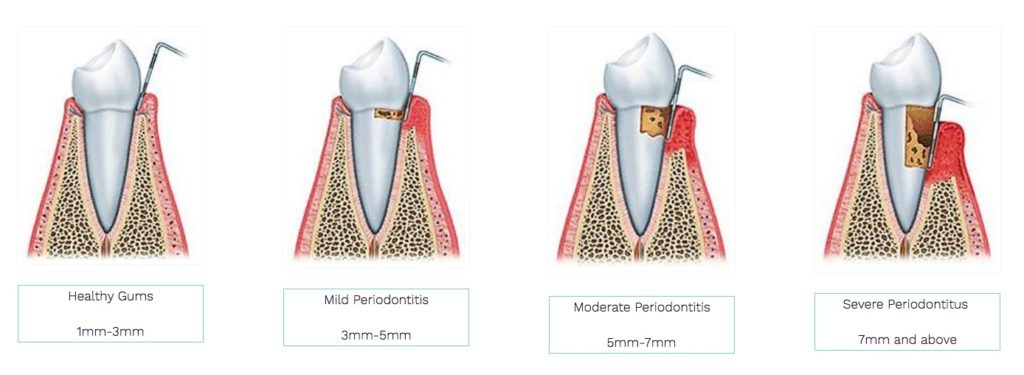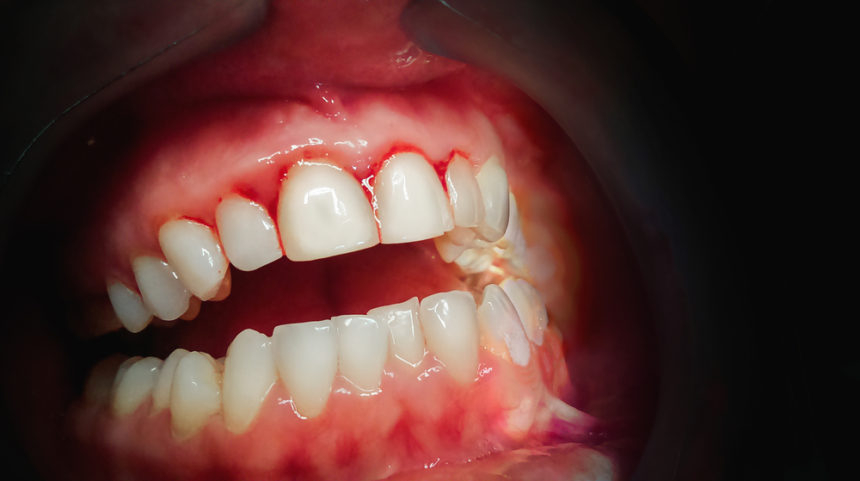No matter how good your teeth look, if the structures supporting them are not in good health, your teeth are destined to fall.
If you notice you are bleeding while brushing, visit us today at Dandenong Dentists to ensure you don’t lose your teeth.
Periodontal/gum disease is preventable.
Research has shown that most adults will encounter some form of periodontal disease during their lifetime.
A daily oral home care routine will help reduce the risk of developing periodontal disease, but will not eliminate it.
Adhering to the 3–6 months active Hygiene Maintenance Program is key to ensuring your periodontal tissue remains healthy and you maintain healthy, stable teeth for life.
What is periodontal/gum disease?
It is a range of diseases that affect the bone and gum/periodontal tissue, which house and support your teeth. It can affect a single tooth, but will more commonly affect many teeth.
What causes periodontal disease?
Periodontal disease is caused by an accumulation of bacteria on your teeth and the release of their associated harmful toxins. This results when there is a sub-optimal daily oral home care routine (i.e. regular brushing and flossing), as well as a lack of commitment to a 6-month Hygiene Maintenance Program with your dentist.
Besides bacterial accumulation, there are also a number of very significant risk factors that drastically increase the chances of you developing periodontal disease, such as:
- Smoking
- Systemic conditions, such as diabetes
- Medications, including, but not limited to, anti-epileptic drugs, steroids and cancer therapy drugs
- Defective margins on dental work
- Crowded/crooked teeth
- Parafunctional habits, such as clenching and grinding
- Pregnancy
What are the types of periodontal disease?
Periodontal gum disease can be broadly characterised into two conditions:
- Gingivitis: an early stage that is reversible
- Periodontitis: an advanced stage that is irreversible
It is important to appreciate that gum disease in its early stages is treatable and can be reversed.
Gingivitis is characterised by gum tissue that appears tender and swollen and often bleeds during brushing and flossing. There is no loss of bone or periodontal tissues that support the teeth.
If left untreated, gingivitis can progress into the more advanced and damaging periodontitis. Periodontitis is the leading cause of tooth loss in adults and its effects are unfortunately irreversible.
Signs of periodontitis include:
- Lingering bad breath
- Bleeding gums
- Red, swollen, tender gums
- Pain when chewing
- Mobile/loose teeth
- Sensitive teeth
- Receding gums or longer appearing teeth
How do I know if I suffer from periodontal disease?
If you notice any of the following signs, we recommend you book a consultation with us so we can assess your periodontal health and advise you on the necessary treatments.
- Bleeding gums
- Lingering bad breath
- Red, swollen, tender gums
- Pain when chewing
- Mobile/loose teeth
- Sensitive teeth
- Receding gums or longer appearing teeth
We assess the state of your periodontal tissue by using an instrument called a Perio-Probe to measure the level of your tissues and any support you may have lost.

How is periodontal disease treated and what can I do to prevent developing it?
First and foremost, book an appointment to see us at Dandenong Dentists so we can assess your periodontal tissue and, if needed, provide the necessary treatment.
A single professional clean often treats gingivitis. You don’t generally require anaesthetic during the treatment, which is aimed at removing bacteria just below and above the gum line.
The treatment for periodontitis is more extensive and generally requires multiple visits with anaesthetic to ensure the bacteria is thoroughly removed from below the gum line. Recall appointments less than 6 months apart are often required.
Following a successful initial treatment, it’s imperative to adhere to a 3–6 month Active Hygiene Maintenance Program.
To ensure periodontal disease doesn’t develop or re-develop following successful treatment, we advise the following protocol:
- Brush twice a day, must be last thing you do before going to bed
- Floss daily, at least once a day and before brushing
- Use fluoride and antiseptic mouthwashes at different times to brushing, i.e. after lunch, after dinner or after a sugary treat
- Smoking cessation
- Controlling systemic conditions
- Adhering to a 3-6 month Active Hygiene Maintenance Program, which will ensure periodontal disease doesn’t develop, but, if it does, we are treating it in its early reversible stages
With research now displaying a possible correlation between gum disease and various systemic diseases such as diabetes, strokes and cardiovascular disease, the 3-6-month Active Hygiene Maintenance Program becomes even more paramount.


